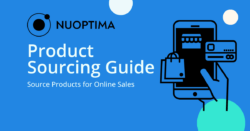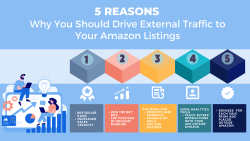Key Points
- Amazon pips eBay to the post in relation to consumer trust, fulfilment methods, market size, and advertising options. It also offers Amazon Prime services. There is little difference between the two marketplaces in terms of seller fees.
- Conversely, Amazon is ruthlessly competitive, which can be a significant disadvantage, plus eBay offers better international expansion options. eBay is usually preferred for second-hand items, whereas Amazon is generally chosen to sell new items.
- Amazon is generally the best option for sellers on an online marketplace, although ultimately, the choice depends on your personal preference and your business type.
If you are an online seller, you will know that there is a surplus of online marketplaces to choose from. However, both Amazon and eBay have been around for a long time, so often, the choice for a seller comes down to these two industry titans. But, which one is best for you and your business? There are pros and cons to both Amazon and eBay, and in this article, we compare the two to help you decide which would work better for your business type.
Which Has the Best Market Size and Selling Potential?
Both eBay and Amazon possess an impressive market size. However, as can be seen by monthly visitors, Amazon has a much larger size. Amazon wins the trophy in terms of raw market size. However, eBay should not be discredited as they are also a major eCommerce player. Indeed, eBay enjoys a slightly younger audience. 32% of users on eBay are aged 35 to 49, while Amazon’s average consumer is between the ages of 45 and 54. If you are looking to sell a niche product with a specific audience in mind, eBay may be the best choice. But, Amazon’s staggering market share simply cannot be ignored.
Which Has the Best Fulfilment Methods?
Our next comparison is looking at the fulfilment options for Amazon and eBay. This means how an order can be fulfilled. With eBay, it is simple. You have to both pack and ship orders by yourself unless you hire a third-party centre to help. Amazon offers two choices: fulfil your orders personally (Seller Fulfilled Prime – SFP) or get Amazon to do this for you (Amazon FBA). The latter is an attractive option for many sellers because it means getting Amazon’s help with your business and not doing everything yourself. By selecting Amazon FBA, your products are stored in Amazon’s nearest warehouse, and they are picked, packed, and shipped for you. Furthermore, FBA provides customer support, removes bad feedback related to shipping, and can send sales made through other channels (including eBay!). Not only does all of this save time, but money as well. Even though Amazon FBA fees are higher, the amount of work they do for your business can make it cheaper than if you took the work on yourself. If you intend to pack and ship your own products, it doesn’t matter which option you go for. But at least with Amazon, you have further options.
Which Do Consumers Trust More?
We now turn to consumer trust. Both marketplaces have been around for almost 30 years, and this calibre of longevity is usually accompanied by much trust. Indeed, Amazon’s Mission Statement highlights a ‘customer obsession’. And Amazon demonstrates their priority for good customer service by its simple returns policy: a shopper can get a full refund if dissatisfied with a product’s quality or delivery time. On the other hand, eBay does not have such a straightforward policy (sellers can select ‘No Returns’, leaving buyers with few options if they are unhappy). As you can imagine, this can be off-putting for a buyer. Consequently, Amazon appears to have more consumer trust, primarily because it offers further support to the customer after product purchases.
Which Has Cheaper Seller Fees?`
Let’s consider Amazon first. Amazon’s fees depend on the product sold and the fulfilment method. Amazon charges for Professional Seller status — this costs £25 a month and provides you with up to 100,000 free listings — and also takes a referral fee for each item sold. On eBay, you need to pay both insertion fees and final value fees. The former applies when you list a product, and the latter applies when you sell it. If you choose to set up a Basic Store, it costs £19.99 per month with 200 free fixed-price listings. You will also probably have to pay a PayPal processing fee on eBay. It is crucial to remember that eBay also charges extra if you want to make a listing truly competitive.
It is hard to compare Amazon and eBay on seller fees as they are reasonably close. Ultimately the costs are determined by the type and volume of products you sell, but it is pretty much even between Amazon and eBay in terms of seller fees.
What Can You Sell on Each Marketplace?
While eBay has been a marketplace since its 1995 launch, Amazon has slowly turned into a retailer as well as being a marketplace for third-party sellers. An important benefit of eBay is that it doesn’t restrict what you can sell on the site (in terms of product quality). eBay is a hub to both brand new and second-hand tatty items; practically anything can be sold here. Of course, Amazon also allows sellers to sell used items, but it is well-known that shoppers prefer eBay when looking for second-hand items (probably due in part to its auction model). The primary exception would be used books, where Amazon takes preference because it originally began as an online bookstore.
However, the major downside to the auction model is that the seller commands little control over final product prices. In contrast, on Amazon, you fix your product price, retaining control over your price and your profit margin. While you can also run fixed-price listings on eBay, it is often a harder sell as shoppers tend to look here for big bargains. Amazon is generally preferred when consumers look for a new or pristine item. Ultimately, the best marketplace for you somewhat depends on what sort of products you are looking to sell.
Which is More Competitive?
Now we turn to one of the major deciding factors: competitiveness. Amazon runs on a product catalogue to provide one clear listing for each unique item. In theory, a customer looking for a product will be directed to the best result regardless of the number of sellers. It is only once you click on the product page that you can view more potential consumers. This is because it is intended to make it easier for the consumer to get a good deal. But, sellers, therefore, have to compete for the prime spot, which could involve hundreds of rivals. This makes Amazon hugely competitive.
Related to its auction roots, eBay allows shoppers to compare multiple listings for the same product, and not all will be new or in excellent condition, and shipping options will differ. This highlights eBay shopping as a considered marketplace. It is good news for sellers, as there are opportunities to adjust your listing to appeal to various audiences, and products have more visibility than Amazon so that shoppers can find the right deal for them. eBay wins this battle, as your product is more likely to be seen on this marketplace, and you benefit from an audience more likely to deliberate.
Who Has the Best Advertising Options?
Amazon offers Amazon Sponsored Products, which gives your products a first-page slot for particular keywords (which you can choose if you want). This works as a pay-per-click (PPC) service, so the seller pays each time your advert gets clicked. Therefore it is important to check how much you’re spending, but Amazon does provide apps and tools to help you manage your campaigns. There are other advertising options for Amazon sellers, and other services aim to promote brands and affiliates.
eBay offers Promoted Listings, which can boost your products in search. With this option, sellers bid an amount to be paid on top of the final value fee, which boosts your product alongside other products that have also been bid by other sellers. Promoted Listings are advantageous because you only pay once an item is sold.
In conclusion, Amazon’s advertising options are more complicated, and they charge a fee regardless of if a sale has been made. Still, Amazon does give sellers more options and control in terms of promotion than eBay.
Which is Preferred for International Expansion?
This section argues whether Amazon or eBay is better at helping sellers transition from domestic to global sales. For Amazon, you need a separate account to sell in each of its international marketplaces, except for Europe and North America, which are grouped together. As you have different accounts for marketplaces, feedback is kept separate, making it more challenging to build a local brand or protect good markets from bad. Helpfully, Amazon offers a Global Store service, so products are displayed to customers in the relevant currency.
eBay allows you to trade across over 20 sites in more than 100 countries with just one account. eBay also has a Global Shipping Programme (GSP), enabling you to ship internationally through a warehouse in your country. eBay deals with customs and imports too. Perhaps the most significant benefit is that GSP is free to join, and the only costs incurred will be paying to send products to your local warehouse.
With this consideration, eBay wins on international expansion. It is simply easier to sell internationally on eBay than on Amazon. However, Amazon may still be the best option for your business as it does possess a considerable share of certain global markets.
A Note on Amazon Prime
One key differentiating feature for Amazon is Amazon Prime, which has contributed to its large and loyal customer base. eBay has nothing like this on their marketplace. With Prime, consumers pay a monthly fee to guarantee speedy delivery, and this fee encourages them to use Amazon as they don’t want their subscription to be wasted. Moreover, Prime members also tend to spend money on the site during big shopping events such as Black Friday and Prime day. Amazon Prime enjoys a customer base of over 150 million people globally, so sellers on this platform have access to a vast audience.
Final Thoughts
Deciding which online marketplace to sell your products can be tricky. Both eBay and Amazon have advantageous options that the other doesn’t, and both enjoy tremendous success. However, ultimately the choice is yours. Tallying up our points, Amazon takes prime spot and provides better overall services, but it depends on you and your business. At NUOPTIMA, we offer expert advice regarding Amazon businesses to help you maximise your success and help your brand grow. If you would like a consultation call regarding your Amazon seller account, book a free discovery call today.



